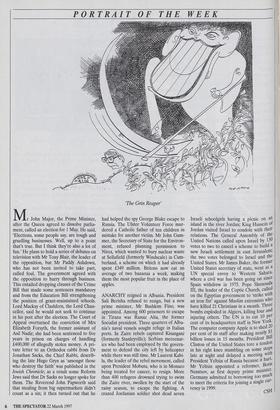PORTRAIT OF THE WEEK
`The Grin Reaper' Mr John Major, the Prime Minister, after the Queen agreed to dissolve parlia- ment, called an election for 1 May. He said, `Elections, some people say, are tough and gruelling businesses. Well, up to a point that's true. But I think they're also a lot of fun.' He plans to hold a series of debates on television with Mr Tony Blair, the leader of the opposition, but Mr Paddy Ashdown, who has not been invited to take part, called foul. The government agreed with the opposition to hurry through business. This entailed dropping clauses of the Crime Bill that made some sentences mandatory and from the Education Bill strengthening the position of grant-maintained schools. Lord Mackay of Clashfern, the Lord Chan- cellor, said he would not seek to continue in his post after the election. The Court of Appeal overturned the conviction of Mrs Elizabeth Forsyth, the former assistant of Asil Nadir; she had been sentenced to five years in prison on charges of handling £400,000 of allegedly stolen money. A pri- vate letter to an Orthodox rabbi from Dr Jonathan Sacks, the Chief Rabbi, describ- ing the late Hugo Gryn as 'amongst those who destroy the faith' was published in the Jewish Chronicle; as a result some Reform Jews said that Dr Sacks no longer spoke for them. The Reverend John Papworth said that stealing from big supermarkets didn't count as a sin; it then turned out that he had helped the spy George Blake escape to Russia. The Ulster Volunteer Force mur- dered a Catholic father of ten children in mistake for another victim. Mr John Gum- mer, the Secretary of State for the Environ- ment, refused planning permission to Nirex, which wanted to bury nuclear waste at Sellafield (formerly Windscale) in Cum- berland, a scheme on which it had already spent £349 million. Britons now eat an average of two bananas a week, making them the most popular fruit in the place of apples.
ANARCHY reigned in Albania. President Sali Berisha refused to resign, but a new prime minister, Mr Bashkim Fino, was appointed. Among 600 prisoners to escape in Tirana was Ramiz Alia, the former Socialist president. Three quarters of Alba- nia's naval vessels sought refuge in Italian ports. In Zaire rebels captured Kisangani (formerly Stanleyville); Serbian mercenar- ies who had been employed by the govern- ment to defend the city left by helicopter while there was still time. Mr Laurent Kabi- la, the leader of the rebel movement, called upon President Mobutu, who is in Monaco being treated for cancer, to resign. More than 400 refugees drowned trying to swim the Zaire river, swollen by the start of the rainy season, to escape the fighting. A crazed Jordanian soldier shot dead seven Israeli schoolgirls having a picnic on an island in the river Jordan; King Hussein of Jordan visited Israel to condole with their relations. The General Assembly of the United Nations called upon Israel by 130 votes to two to cancel a scheme to build a new Israeli settlement in east Jerusalem; the two votes belonged to Israel and the United States. Mr James Baker, the former United States secretary of state, went as a UN special envoy to Western Sahara, where a civil war has been going on since Spain withdrew in 1975. Pope Shenouda III, the leader of the Coptic Church, called on the Egyptian government to 'strike with an iron fist' against Muslim extremists who have killed 21 Christians in a month. Three bombs exploded in Algiers, killing four and injuring others. The UN is to cut 10 per cent of its headquarters staff in New York. The computer company Apple is to shed 20 per cent of its staff after making nearly $1 billion losses in 15 months. President Bill Clinton of the United States tore a tendon in his right knee stumbling on some steps late at night and delayed a meeting with President Yeltsin of Russia because it hurt Mr Yeltsin appointed a reformer, Boris Nemtsov, as first deputy prime minister. Germany admitted to borrowing too much to meet the criteria for joining a single cur-


































































 Previous page
Previous page